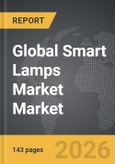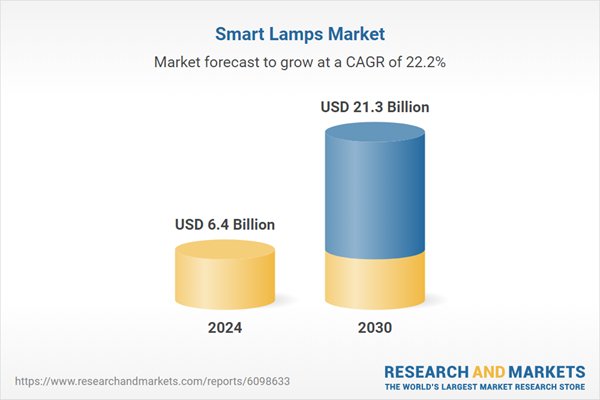Global Smart Lamps Market - Key Trends & Drivers Summarized
Can Lighting Systems Evolve into Smart Lifestyle Hubs for the Digital Age?
Smart lamps are at the forefront of the growing smart home revolution, evolving beyond mere illumination devices into multifunctional lifestyle tools. With integrated connectivity features like Wi-Fi, Bluetooth, and Zigbee, smart lamps can now respond to voice commands, sync with mobile apps, and adjust to environmental stimuli. These intelligent lighting systems offer adaptive brightness, color temperature modulation, circadian rhythm support, and integration with virtual assistants such as Alexa, Siri, and Google Assistant. Consumers are increasingly viewing lighting as a tool to enhance mood, productivity, and wellness - prompting a surge in demand for smart lamps that offer personalized, programmable experiences. Whether it's simulating sunrise to ease morning wake-ups or adjusting hues for concentration or relaxation, smart lamps are transforming the way people interact with indoor environments. Their appeal extends to tech-savvy urban dwellers, wellness-conscious consumers, and sustainability advocates alike. The growing popularity of minimalist and multi-use designs in modern homes further boosts interest, as smart lamps combine style, utility, and automation in a single product. This shift marks a redefinition of lighting from passive fixture to active participant in daily living.Why Are Wellness, Aesthetics, and Home Automation Converging Around Smart Lighting?
The rising awareness of how light affects sleep, mood, and health is a key driver behind the surge in smart lamp adoption. Unlike conventional lighting, smart lamps can simulate natural daylight cycles to regulate melatonin production and support better sleep hygiene. Tunable white and RGB color features allow users to customize lighting environments for reading, meditation, gaming, or creative work. With the continued expansion of the wellness economy, smart lamps that promote eye comfort, circadian alignment, and ambient personalization are gaining strong traction. Simultaneously, smart lamps are becoming design elements in their own right - incorporating sleek, minimalistic, and futuristic aesthetics that blend seamlessly with modern interiors. The ability to schedule lighting, automate based on user behavior, or link with sensors for motion-activated responses creates compelling use cases for both convenience and energy efficiency. In smart homes, these lamps often act as nodes within broader home automation ecosystems, syncing with security systems, HVAC, and even entertainment setups. This convergence of wellness, visual appeal, and functional automation is expanding the appeal of smart lamps across residential, commercial, and hospitality markets.How Are Technological Innovations and Sustainability Priorities Shaping the Product Landscape?
Technological advancements are significantly influencing the capabilities and adoption of smart lamps. The integration of AI and machine learning enables dynamic lighting adjustment based on user patterns and preferences, while smart sensors embedded within the lamps can monitor room occupancy, ambient light levels, and even air quality. Energy-efficient LED technology lies at the core of most smart lamp designs, offering longevity and low power consumption - a key selling point for eco-conscious consumers. Moreover, the increasing prevalence of Matter, an interoperability standard backed by major tech players, is ensuring that smart lamps from different brands can seamlessly communicate within a unified smart home ecosystem. Developers are also experimenting with new features such as gesture control, biometric responsiveness, and mood recognition lighting. Meanwhile, many brands are responding to environmental concerns by using recyclable materials, biodegradable packaging, and power-saving modes. Cloud connectivity and over-the-air updates allow manufacturers to push new features post-purchase, extending the lifespan and value of the product. These innovations are not only enhancing user experience but also aligning with global priorities around sustainability, digital integration, and circular product lifecycles.What Market Forces Are Driving Adoption and Expanding Smart Lamp Use Cases?
The growth in the smart lamps market is driven by several factors rooted in technological readiness, shifting consumer expectations, and evolving interior and urban living trends. The widespread adoption of smart home devices and increasing household penetration of voice assistants are making smart lamps a natural next step for connected living. Rising consumer preference for personalized, wellness-oriented environments is generating strong demand for lighting that adapts to individual moods, habits, and health needs. Urbanization and smaller living spaces are pushing buyers to invest in multifunctional, space-efficient products - positions smart lamps fulfill by combining lighting, automation, and even charging docks or Bluetooth speakers. The rise of remote work has further accelerated interest in lamps that support productivity, reduce eye strain, and create conducive work-from-home environments. In commercial settings, smart lighting solutions are being deployed to reduce energy bills, automate facility management, and enhance workplace ambiance. Meanwhile, affordability improvements and a wider range of form factors - such as floor lamps, desk lamps, bedside models, and ceiling-mounted units - are broadening accessibility across income brackets. Government incentives and green building regulations promoting energy-efficient appliances are also contributing to growth. Collectively, these forces are fueling a dynamic global market where smart lamps are no longer just lighting solutions - they're lifestyle companions and energy-smart design essentials for the future.Report Scope
The report analyzes the Smart Lamps market, presented in terms of market value (US$). The analysis covers the key segments and geographic regions outlined below:- Segments: Type (Halogen, Compact Fluorescents, Linear Fluorescents, LEDs, Incandescent); Application (Residential, Commercial, Industrial, Outdoor).
- Geographic Regions/Countries: World; United States; Canada; Japan; China; Europe (France; Germany; Italy; United Kingdom; and Rest of Europe); Asia-Pacific; Rest of World.
Key Insights:
- Market Growth: Understand the significant growth trajectory of the Halogen Lamps segment, which is expected to reach US$10 Billion by 2030 with a CAGR of a 23.3%. The Compact Fluorescents segment is also set to grow at 24.2% CAGR over the analysis period.
- Regional Analysis: Gain insights into the U.S. market, valued at $1.7 Billion in 2024, and China, forecasted to grow at an impressive 20.9% CAGR to reach $3.2 Billion by 2030. Discover growth trends in other key regions, including Japan, Canada, Germany, and the Asia-Pacific.
Why You Should Buy This Report:
- Detailed Market Analysis: Access a thorough analysis of the Global Smart Lamps Market, covering all major geographic regions and market segments.
- Competitive Insights: Get an overview of the competitive landscape, including the market presence of major players across different geographies.
- Future Trends and Drivers: Understand the key trends and drivers shaping the future of the Global Smart Lamps Market.
- Actionable Insights: Benefit from actionable insights that can help you identify new revenue opportunities and make strategic business decisions.
Key Questions Answered:
- How is the Global Smart Lamps Market expected to evolve by 2030?
- What are the main drivers and restraints affecting the market?
- Which market segments will grow the most over the forecast period?
- How will market shares for different regions and segments change by 2030?
- Who are the leading players in the market, and what are their prospects?
Report Features:
- Comprehensive Market Data: Independent analysis of annual sales and market forecasts in US$ Million from 2024 to 2030.
- In-Depth Regional Analysis: Detailed insights into key markets, including the U.S., China, Japan, Canada, Europe, Asia-Pacific, Latin America, Middle East, and Africa.
- Company Profiles: Coverage of players such as AeroFarms, Agrilution GmbH, AVA Technologies Inc., BSH Hausgeräte GmbH, CityCrop and more.
- Complimentary Updates: Receive free report updates for one year to keep you informed of the latest market developments.
Some of the 37 companies featured in this Smart Lamps market report include:
- Acuity Brands, Inc.
- Control4
- Current Lighting Solutions
- GE Lighting (Savant Company)
- Ledvance GmbH
- LIFX
- Linkind
- Nanoleaf
- Occhio GmbH
- Philips Hue (Signify)
- Sengled
- Smart Lighting Company
- Smart Lighting Solutions
- Smart Vision Lights
- The Smart Lighting Company
- TP-Link
- Tuya Smart
- V-TAC
- Yeelight
- Xiaomi
This edition integrates the latest global trade and economic shifts into comprehensive market analysis. Key updates include:
- Tariff and Trade Impact: Insights into global tariff negotiations across 180+ countries, with analysis of supply chain turbulence, sourcing disruptions, and geographic realignment. Special focus on 2025 as a pivotal year for trade tensions, including updated perspectives on the Trump-era tariffs.
- Adjusted Forecasts and Analytics: Revised global and regional market forecasts through 2030, incorporating tariff effects, economic uncertainty, and structural changes in globalization. Includes historical analysis from 2015 to 2023.
- Strategic Market Dynamics: Evaluation of revised market prospects, regional outlooks, and key economic indicators such as population and urbanization trends.
- Innovation & Technology Trends: Latest developments in product and process innovation, emerging technologies, and key industry drivers shaping the competitive landscape.
- Competitive Intelligence: Updated global market share estimates for 2025, competitive positioning of major players (Strong/Active/Niche/Trivial), and refined focus on leading global brands and core players.
- Expert Insight & Commentary: Strategic analysis from economists, trade experts, and domain specialists to contextualize market shifts and identify emerging opportunities.
Table of Contents
Companies Mentioned (Partial List)
A selection of companies mentioned in this report includes, but is not limited to:
- Acuity Brands, Inc.
- Control4
- Current Lighting Solutions
- GE Lighting (Savant Company)
- Ledvance GmbH
- LIFX
- Linkind
- Nanoleaf
- Occhio GmbH
- Philips Hue (Signify)
- Sengled
- Smart Lighting Company
- Smart Lighting Solutions
- Smart Vision Lights
- The Smart Lighting Company
- TP-Link
- Tuya Smart
- V-TAC
- Yeelight
- Xiaomi
Table Information
| Report Attribute | Details |
|---|---|
| No. of Pages | 143 |
| Published | February 2026 |
| Forecast Period | 2024 - 2030 |
| Estimated Market Value ( USD | $ 6.4 Billion |
| Forecasted Market Value ( USD | $ 21.3 Billion |
| Compound Annual Growth Rate | 22.2% |
| Regions Covered | Global |









